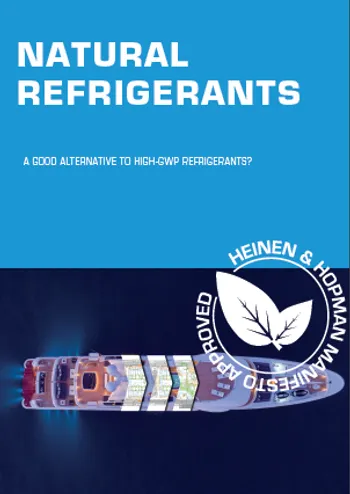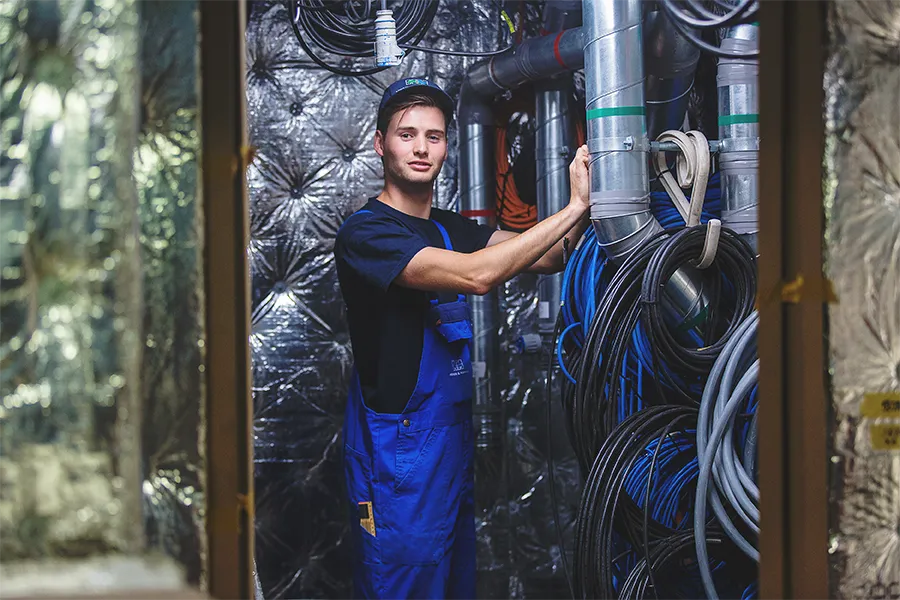
Natural Refrigerants Whitepaper
Natural refrigerants are a hot topic. More and more onshore utility based installations are switching to natural gas. What’s the situation in the maritime industry? Selecting the right refrigerant is no easy task as each type has its own pros and cons. In this whitepaper we will explore the most common natural refrigerants so you can understand which one best suits your specific application.
Natural Refrigerants: Sustainable Cooling for Maritime HVAC
Natural refrigerants are becoming essential in the drive towards more sustainable and eco-friendly maritime HVAC systems. These refrigerants offer low global warming potential (GWP) and minimal environmental impact compared to traditional synthetic options. Our whitepaper provides an in-depth analysis of the leading natural refrigerants and their suitability for maritime applications. Discover how you can enhance both the efficiency and sustainability of your operations by understanding the benefits and challenges of these refrigerants.
Why choose natural refrigerants?
As the world shifts towards more sustainable solutions, natural refrigerants have emerged as a key component in reducing the global warming potential (GWP) of HVAC systems. Unlike traditional synthetic refrigerants, which can have a GWP up to 4000 times that of CO2, natural refrigerants offer a low-GWP alternative that is both eco-friendly and effective.
Key takeaways of this whitepaper
This whitepaper provides comprehensive insights into natural refrigerants and their applications in maritime HVAC systems. It’s designed to assist you in making informed decisions, whether you’re upgrading an existing system or planning a new installation. Here’s an overview of what you’ll explore:
- Comparative Analysis: Dive deep into the advantages and disadvantages of widely-used natural refrigerants such as CO2 (R744), Ammonia (R717), and Propane (R290).
- Alternative Options: Assess how these eco-friendly refrigerants compare to newer synthetic alternatives like R1234ze.
- Practical Application: Gain understanding of the critical factors involved in selecting the most suitable refrigerant for maritime environments.
- Safety and Environmental Considerations: Examine the key aspects of safety, sustainability, and energy efficiency that play a crucial role in refrigerant selection.
The environmental impact of refrigerants
Selecting the right refrigerant isn’t just about optimizing performance; it’s about safeguarding the planet’s future. Natural refrigerants like CO2, Ammonia, and Propane have little to no ozone depletion potential and significantly lower global warming potential compared to synthetic alternatives. By choosing environmentally friendly refrigerants, you actively contribute to reducing greenhouse gas emissions, helping to mitigate climate change and protect the environment for future generations.
In the maritime industry, where refrigerant leak rates can be high, the environmental benefits of natural refrigerants become even more significant. By reducing the release of harmful substances into the atmosphere, these refrigerants promote sustainable operations and help ensure compliance with stringent environmental regulations.
Why This Matters for Maritime HVAC
In the maritime industry, the choice of refrigerant is critical due to the unique challenges posed by the marine environment, including high leak rates and the need for robust safety measures. Natural refrigerants not only help reduce the environmental footprint of your operations but also align with future regulations that are likely to phase out high-GWP synthetic refrigerants.
Download the Whitepaper
Ready to dive deeper? Download our whitepaper now to explore the full spectrum of natural refrigerants and learn how they can enhance the sustainability and efficiency of your maritime HVAC systems.
Interested in more Maritime HVAC&R solutions? Visit our knowledge base for deep dives on other subjects.

When required to navigate to regions with extreme climates far from supply lines, it’s important to know you can rely on your HVAC system no matter what.
FAQs about natural refrigerants

What makes natural refrigerants environmentally friendly?
Natural refrigerants do not deplete the ozone layer and have a low impact on global warming compared to synthetic refrigerants.
Can natural refrigerants be used in existing refrigeration systems?
Retrofitting existing systems can be challenging and depends on the specific system and refrigerant requirements.
What safety measures are necessary when using natural refrigerants?
Proper training, equipment, and adherence to safety standards are crucial, especially when handling flammable or toxic refrigerants.
How do natural refrigerants compare in terms of performance?
When properly implemented, natural refrigerants can offer superior performance and efficiency compared to their synthetic counterparts.
What is driving the renewed interest in natural refrigerants?
Environmental regulations, rising awareness about climate change, and advances in refrigeration technology are key factors.